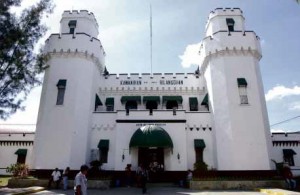
FOR HIGH-LIVING CONVICTS Until a pre-Christmas government inspection last month, theNew Bilibid Prison in Muntinlupa City allowed luxurious accommodations for rich and powerful inmates. The inspection also led to the discovery of guns, drugs, cash, jewelry and sex toys in the VIP inmates’ secret rooms, resulting in the sacking of top prison officials. INQUIRER PHOTO
MANILA, Philippines–One of the VIPs (very important prisoners) who was transferred from the New Bilibid Prison (NBP) to the National Bureau of Investigation jail on suspicion of being a member of a narcotics syndicate operating from inside the NBP had been recommended for parole, according to documents obtained by the Inquirer.
The endorsement for parole of German Luna Agojo, also known as Arman, 52, who has been serving a life sentence for dealing in illegal drugs since 2002, was among the papers found when an NBI and Philippine National Police Special Action Force team led by Justice Secretary Leila de Lima swooped down on the reportedly luxurious quarters of the VIPs in the NBP’s maximum security compound last month.
Agojo was charged and convicted by the Tanauan, Batangas, Regional Trial Court (RTC) of selling “shabu,” or methamphetamine hydrochloride, in 1999.
In 2007, the Court of Appeals affirmed the RTC decision, and the decision was also subsequently upheld by the Supreme Court.
Police have tagged Agojo as the alleged mastermind in the killing of Voltaire Rosales, the Batangas RTC judge who convicted Agojo. Rosales was killed in 2004 near the Tanauan Hall of Justice by two motorcycle-riding men.
Certification from chaplain
Agojo’s name again cropped up in 2009 following the disclosure by the Supreme Court that Associate Justice Arturo Brion had received death threats after he affirmed Rosales’ decision to impose the death penalty on Agojo.
Also found in Agojo’s detention cell were certification letters from NBP chaplain Msgr. Roberto Olaguer, dated June 26, 2012, stating that Agojo had served as a Church worker from Dec. 16, 2002, to 2006.
Another set of documents was a barangay (village) clearance issued by Guillermo Endrinal, the barangay chair of Cale, Tanauan, Batangas, dated
Sept. 27, 2012.
Basis for parole unclear
“This is to certify that Mr. German L. Agojo , Filipino of legal age is a resident of barangay Cale, Tanauan City, Batangas. The above name whom known personally is of good moral character and law abiding citizen (sic). I have verified further that the said person has never been booked of any criminal offenses involving moral turpitude, neither is there any record or imputed against him as of this writing,” the certification stated.
It was not clear why Agojo needed a barangay clearance when at the time it was issued he was still supposed to have been incarcerated at the NBP maximum security compound.
The recommendation for parole for Agojo, dated July 19, 2012, was signed by Teodora M. Diaz in her capacity as the officer in charge of the Office of the Asst. Director of the Bureau of Corrections (BuCor). It said that Diaz was issuing it “by authority of the acting Director Gaudencio Pangilinan.”
The letter, labeled the first endorsement, was written on the letterhead of the BuCor addressed to Reynaldo G. Bayang, the executive director of the Board of Pardons and Parole.
“The herein endorsed certified true copy of Carpeta and Prison Records of inmate German Luna Agojo, N202P-3044 together with a copy of a medical abstract as requested in your letter dated June 21, 2012,”
Diaz wrote.
It was not clear what the basis was for recommending parole—the release of a prisoner from prison after serving the minimum period of his indeterminate sentence—for Agojo, who at the time had served 10 years of his life sentence.
According to the website of the Board of Parole and Probation Administration, a prisoner may be granted parole “whenever the Board of Pardons and Parole finds that there is reasonable probability that, if released, the prisoner will be law-abiding and that his release will not be incompatible with the interest and welfare of society and when a prisoner has already served the minimum penalty of his indeterminate sentence of imprisonment.”
Other documents found in Agojo’s quarters also showed that Agojo, who had been diagnosed with bronchial asthma based on the medical certificate dated June 13, 2012, issued by Dr. Ernesto L. Tamayo, acting head, Medical and Dental Division, was confined at the Asian Medical Center in April and May 2012 for “difficulty of breathing.”
RELATED STORIES
‘Prison officials OK’d contraband’
Bilibid VIPs tipped off on raid